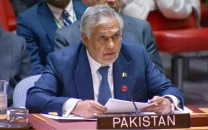Bill to curb child marriage enacted into law
President Asif Ali Zardari signed the Child Marriage Restraint Bill, 2025

President Asif Ali Zardari on Friday signed the Child Marriage Restraint Bill 2025 into law, setting the minimum age for marriage at 18 years in the Islamabad Capital Territory (ICT).
The new legislation criminalises the solemnisation of marriages where either the boy or girl is underage.
Under the law, no Nikah khuwan (marriage officiant) may conduct a marriage involving minors, with violations punishable by up to one year in prison and a fine of Rs100,000.
Additionally, a man over 18 who marries an underage girl may face up to three years of rigorous imprisonment.
The bill also empowers courts to intervene if informed of an underage marriage, including protecting the identity of those reporting such cases.
PPP Senator Sherry Rehman hailed the bill as a landmark victory in the fight against child marriage, describing it as a crucial step toward protecting the rights of women and children.
“This law is a result of a long and difficult struggle, and it will help improve the education and health of young girls," said Rehman.
Thank you President @AAliZardari for signing into law the #ChildMarriageRestraint bill despite all pressure! Proud moment for #Pakistan
— SenatorSherryRehman (@sherryrehman) May 30, 2025
Thank you to all the women and men who made this possible after a long journey of twists and turns. 🙌 pic.twitter.com/pSUr7aBNon
She further acknowledged the role played by PPP Chairman Bilawal Bhutto, party leaders, other political representatives, and public support in securing the bill's passage.
In addition, Malaika Reza, General Secretary of the PPP Human Rights Cell, expressed her appreciation for the leadership shown by President Zardari.
READ MORE: CII takes exception to child marriage bill
She referred to the bill as a "significant victory" in the fight to safeguard women's and children's rights.
The bill was initially introduced in the National Assembly by PPP MNA Sharmila Faruqui and later presented in the Senate by Senator Rehman.
However, the legislation faced opposition from the Council of Islamic Ideology (CII), which declared the bill contrary to Islamic principles.
The Human Rights Commission of Pakistan (HRCP) has strongly criticised the Council of Islamic Ideology (CII) for raising objections to the recently passed Islamabad Capital Territory Child Marriage Restraint Bill, calling the move a serious attempt to hinder vital child protection legislation.
HRCP expressed deep concern over the CII’s stance, which challenges the bill that sets 18 years as the minimum legal age for marriage and criminalizes child marriage in the federal capital.
“The bill establishes a long-overdue legal standard in Pakistan and aligns with both constitutional guarantees and international human rights commitments,” the HRCP stated.
“Framing child protection as incompatible with religion not only undermines the rights of every child but also reflects a deeply lopsided interpretation of Islamic principles.”
The CII, in its advisory response, objected to the bill by arguing that Islamic jurisprudence permits the marriage of girls once they attain puberty, regardless of age.
The council maintains that setting a fixed minimum age of 18 for marriage contradicts certain religious interpretations and therefore should not be made legally binding.
HRCP countered this view, asserting that the state has to legislate in the best interest of children, particularly to prevent early marriages that have been linked to serious health risks, denial of education, and systemic gender inequality.
The rights body called on the federal government to resist pressures that seek to dilute the bill and to ensure its full and immediate implementation.
“The state must not capitulate to regressive positions that endanger children’s lives and futures,” the statement concluded.




















COMMENTS
Comments are moderated and generally will be posted if they are on-topic and not abusive.
For more information, please see our Comments FAQ